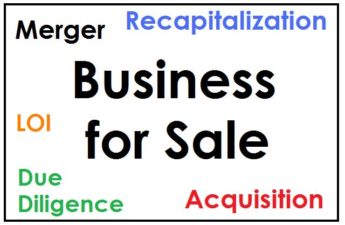The owner of a privately held business has made the decision to sell their company. What is the process for this? What steps should be taken and in what order? Here is an outline of the key steps in the sales process. The process is basically the same for deals of all sizes and types. It assumes the business that is being sold has value. The goal is to start an auction, if at all possible. Should the business be troubled in some way, the sales materials will be more targeted to a specific buyer(s) and will focus on them.…
Category: Buying & Selling a Company
Sky High Prices To Buy A Company? What Can Buyers Do?
When an economy is growing and strong, the prices of companies for sale tend to rise. Sometimes a company is priced in a high range even if the overall economy is weak. Higher prices mean higher risk for everyone but especially for financial acquirers. Sky-high prices decrease the chances that the deal will close. What can a buyer do in these circumstances especially when only limited capital is available? Add some sort of unique value? Only invest in a minority stake? Buyer smaller companies? Joint Ventures? Maybe some sort of creative structuring? Here are some more ideas: First, buyers should…
Selling a Company in a Pandemic
The worst of times can make the difficult process of selling a business even harder. Even when economic conditions are favorable, most M&A transactions collapse multiple times before finally closing. When the economic environment is difficult – extremely difficult – you can count on additional problems and hurdles to getting a deal done. Even if the transaction is attractive including terms that are advantageous to both parties, both buyers and sellers may be fighting to handle business and personal issues. The last thing on everyone’s mind could be getting the transaction to the finish line. Delays are inevitable in the…
Why it can be so hard to sell a business
It’s all about supply and demand. Here are some facts. About 4.2 million companies or 70% of all businesses that employ more than one person are owned by someone who is aged 53 or older. Around 8,000 people turn 65 every day and this isn’t changing for a while. Until the baby boom cohort is done. Most business owners have delayed selling their business because of the terrible economic recession starting in 2008. They were and are waiting for better market conditions. Here are some more facts. Private Equity Groups (PEGs) own 7,700 to 8,000 companies. By definition, a PEG…
Seven More Factors That Will Change the Value of Your Business
My last article listed seven factors that can and will affect the value of your business. That list was not comprehensive. There are more. Here are seven more factors you, the owner of a privately held business, should consider. The additional seven-factors are: 1) Narrow Customer Base (Concentration) lowers value. Most successful companies try to reduce dependence on a few large customers. Should any one customer be lost, the effect on business earnings is then minimal. The more loyal and diverse the customers that a company has the higher its value. It is even better to have long-established contracts with…
Seven Factors That Will Increase The Value of Your Business
What do Buyers specifically look for when buying a business? Or stated another way, what factors affect business value? What increases or decreases business value? There are many things that affect business value. Some may be obvious others not so much. But all will require that you, the business owner, pay attention to them. Here are seven factors to consider. 1) Poor Quality Financials. Having poorly prepared financial statements means the Buyer may not know what he/she is buying. And there may be hidden problems in the company. It is best to have independently audited financial statements that do not…
How Do Buyers Value a Business? (Danger: Wonkish)
The overriding theme of business valuation for Mergers & Acquisitions is that anything that increases Cash Flow increases the value of the business. Cash Flow (not profits) is the most important factor. The methods listed are for established businesses with ongoing revenues. Valuing startups is another thing entirely. The specific technique used to value a business can vary, and the use of any depends on what the buyer prefers. But here are some common ones. Smaller businesses bought by an owner/operator tend to be valued based on: a multiple of Seller’s Discretionary Cash Flow (Owner’s Salary & Benefits + EBITDA…






